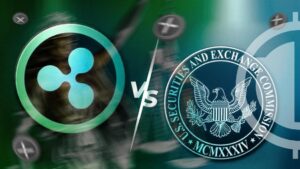
Ripple, the prominent cryptocurrency and blockchain company, recently took to Twitter to debunk five common myths surrounding cryptocurrency and blockchain technology. The company aims to clarify misconceptions and educate business leaders on the benefits of crypto in improving operations, increasing agility, and reducing costs.
In a bid to debunk common cryptocurrency myths, the crypto firm tweeted:
To fully utilize the benefits of #crypto, business leaders must decipher fact from fiction.
— Ripple (@Ripple) June 29, 2023
See through some common crypto myths and learn how the technology can improve operations, increase agility and lower costs. https://t.co/xO24FbKKIB
The first myth Ripple tackled was that cryptocurrency is a passing fad. The company highlighted the growing utility of crypto and blockchain solutions across industries, with major brands like PayPal, Visa, and Starbucks launching crypto rewards for customers. Central banks and governments globally are also exploring the use of crypto and blockchain, particularly in the form of Central Bank Digital Currencies (CBDCs), in a bid to improve financial inclusion and efficiency.
Ripple also addressed the myth that crypto is inherently risky and volatile. While acknowledging the market volatility of cryptocurrencies, the company pointed out that not all crypto-enabled solutions or digital assets are equal. Stablecoins, for instance, are pegged to major currencies like the US dollar and hence exhibit minimal volatility.
The third myth that Ripple debunked was that crypto is unsustainable. Ripple argued that crypto could contribute to sustainability gains. The XRP Ledger, Ripple’s blockchain, was highlighted as an example of a green blockchain design that doesn’t require energy-intensive mining. Furthermore, Ripple emphasized that blockchain technology could advance climate change mitigation efforts, particularly through the tokenization of carbon credits.
The fourth myth was that crypto solutions are complex and difficult to implement. Ripple drew a parallel to the early days of the internet, arguing that just as the internet became more user-friendly over time, so too is the crypto industry evolving to become more accessible. Ripple itself is involved in this process, offering enterprise-grade crypto solutions to facilitate cross-border payments and integrate digital assets with traditional financial systems.
The final myth Ripple dispelled was that crypto lacks global regulatory clarity. The company pointed to the increasing use of crypto solutions worldwide, which is driving a parallel increase in regulation. Ripple cited upcoming legislative acts in the UK as evidence that the crypto asset class is receiving recognition and regulation.
Meanwhile, Ripple is currently embroiled in a legal dispute with the U.S. Securities and Exchange Commission (SEC). The case recently took an unexpected turn following the emergence of undisclosed emails from William Hinman, a former director of the SEC’s corporation finance division.














